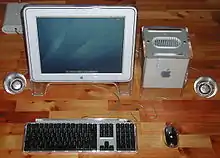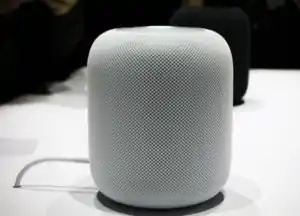Apple speakers
Apple Inc. has produced and sold numerous music and multimedia speakers, available for standalone purchase and bundled with Macintosh products.
Bose Roommate speakers
In September 1986, Apple bundled (as well as sold separately) a special edition of the Bose Roommate speakers for the Apple IIGS computer–which sported a built-in Ensoniq synthesizer chip with optional stereo sound. The front grille each of speaker had the "Bose" logo in a black box, and the official rainbow Apple logo next to it. The speakers matched the same platinum gray color scheme introduced with the IIGS that year. Later editions of the speakers, likely for legal issues pertaining to Apple Records, replaced the Apple shaped logo with a rainbow colored square. The powered speakers lacked a variable volume knob or magnetic shielding (a warning label stated to keep it distanced from the CRT and magnetic storage) and retailed for US$299.99. Although primarily aimed at the Apple IIGS which it cosmetically matched and better suited for, the speakers were also made available for early Macintosh models.[1]
AppleDesign Powered Speakers
.jpg.webp)
Along with the PowerCD introduced in 1993, Apple released two versions of their desktop speakers: the AppleDesign Powered Speakers and the redesigned AppleDesign Powered Speakers II a year later. The original speakers came in platinum gray to match Apple's desktop line, while the second generation were smaller, curvier and came in both platinum gray and a darker granite gray color designed to match the PowerBook line and PowerCD. Both were powered with an AC adapter and could be attached to any audio output source, with two separate inputs for the computer and an external CD player. Both had a headphone jack in the front of one speaker along with the volume control and an optional subwoofer connection port on some models.
G4 Cube speakers
Apple bundled a pair of model M7963 unnamed clear spherical or globe speakers with the Power Mac G4 Cube, which was released on July 19, 2000. They used a custom USB interface that only worked with the G4 Cube and ADP monitors. They were created in partnership with Harman Kardon, and were enlarged versions of the Odyssey speakers built in to the iMac G3.[2][3][4]
Apple Pro Speakers

Apple Pro Speakers were introduced in January 2001 alongside the Power Mac G4 Digital Audio, based on the G4 Cube's spherical speakers with a new digital audio system, plastic grilles, white rubber/silicone surrounds rather than the black foam used on the G4 cube speakers and changed the connector to a proprietary minijack that provided both power and audio. They were available as a standalone purchase for $59 and bundled with some versions of the iMac G4.[3][4]
Harman Kardon SoundSticks and iSub
.jpg.webp)
Apple announced the iSub in 1999, a 6-inch subwoofer produced in partnership with Harman Kardon, designed by Jony Ive.[5] It uses clear plastic to match the aesthetic of the iMac G3. It connected over USB.[6]
Harman Kardon and Apple next designed SoundSticks, which were introduced at the 2000 Macworld expo.[7] Apple led the industrial design and mechanical engineering to have them fit into its product family. They include a new revision of the iSub. They won an Industrial Design Excellence Awards gold award[8] and were featured on the cover of I.D. magazine. SoundSticks II were a minor upgrade, adding capacitive volume control buttons and a 3.5mm mini-jack input, replacing the previous USB input. SoundSticks III changed the styling slightly using black highlights and white lighting, instead of green and blue of the original SoundSticks and the SoundSticks II.[9] SoundSticks Wireless introduced Bluetooth.[10]
iPod Hi-Fi

iPod Hi-Fi is a speaker system that was released on February 28, 2006, for use with any iPod digital music player.[11] The iPod Hi-Fi retailed at the Apple Store for US$349 until its discontinuation on September 5, 2007.[12][13] The iPod Hi-Fi received criticism due to its high price,[14] lack of an AM/FM radio,[15] and the limited functionality of its remote control.[16]
HomePod

HomePod is a smart speaker, announced on June 5, 2017. Its launch was later delayed from December 2017 to early 2018. Designed to accompany other Apple products such as the iPhone and Mac, the HomePod is designed to work with Apple Music to create a "new way for you to discover and interact with music at home," according to Apple marketers.[17] It incorporates beamforming and eight speakers and is sold in two colors: white and space gray.[18] It has a small touchscreen on its top, and seven tweeters in its base and a four-inch woofer towards the top, as well as six microphones used for voice control and acoustic optimization.[19] Its iOS-based operating system, "audioOS",[20] enables the HomePod to play audio, run the Siri voice assistant, and control the device's screen.
HomePod Mini
HomePod Mini was announced on October 13, 2020. It is smaller than the HomePod, roughly spherical, and has three speakers and four microphones.[21][22] Intercom, a new feature on HomePod and HomePod Mini introduced in iOS 14.1 and iPadOS 14.1, allows iPhone, iPad, and Apple Watch users with multiple HomePods and HomePod Minis to communicate between rooms using their voice. Siri recognizes up to six voices, and personalizes responses for each one.
References
- http://stereo2go.com/forums/threads/the-forgotten-collabration-sony-d-50-and-bose-speakers.5033/
- "Harman/Kardon Mac Compatibility Guide". Low End Mac. 2001-05-31. Retrieved 2019-10-08.
- Steeber, Michael (2018-03-19). "Revisiting the forgotten history of obscure Apple accessories". 9to5Mac. Retrieved 2019-10-07.
- Phin, Christopher; Contributor; hardware, Macworld | About | A. celebration of classic Apple; software (2015-12-08). "The best speakers 'Apple' ever made". Macworld. Retrieved 2019-10-07.
- La, Lynn. "Jony Ive's 15 most iconic Apple products and designs". CNET. Retrieved 2019-10-07.
- "Jobs Splits iMac Line over Digital Video". TidBITS. 1999-10-11. Retrieved 2019-10-07.
- "Harman Kardon History". Archived from the original on 2015-02-27. Retrieved 2015-02-25.
- "iSub: Gold, Consumer Products". Industrial Designers Society of America. Archived from the original on 2003-12-07. Retrieved 6 December 2014.
- SoundSticks page Retrieved on 2011-08-11 Archived August 5, 2011, at the Wayback Machine
- SoundSticks page Review: Harman Kardon SoundSticks Wireless at the Wayback Machine (archived April 4, 2016)
- "Apple Announces iPod Hi-Fi". Apple. Retrieved 2014-11-20.
- Schramm, Mike (2007-09-05). "Bye bye, HiFi". Engadget. Archived from the original on 2014-11-23. Retrieved 2020-01-24.
- Block, Ryan (2007-09-06). "Apple Hi-Fi, RIP: 2006 - 2007". Engadget. Retrieved 2014-11-20.
- Borland, John (2006-02-28). "iPod Hi-Fi has big-sounding ambitions". CNET. Archived from the original on 2012-07-12. Retrieved 2006-03-01.
- Guevin, Jennifer (2006-02-28). "Bloggers underwhelmed by Apple announcements". CNET. Archived from the original on 2012-07-16. Retrieved 2006-03-01.
- iPod Hi-Fi User guide. "Chapter 3, Using the Apple Remote, pages 20-21" (PDF). Apple.com. Archived from the original (PDF) on November 28, 2007. Retrieved May 25, 2007.
- Apple inc. HomePod - Apple. Retrieved 2 February 2019
- "Everything about HomePod". iMore. Archived from the original on 20 June 2017. Retrieved 2017-06-19.
- "This iFixit teardown shows the HomePod is built like a tank". The Verge. Archived from the original on 12 February 2018. Retrieved 2018-02-14.
- "Leaked audio files reveal HomePod's cool UI sounds - Cult of Mac". 1 August 2017. Archived from the original on 22 March 2018.
- "Apple Event — October 13".
- "HomePod mini". Apple. Retrieved 2020-10-15.